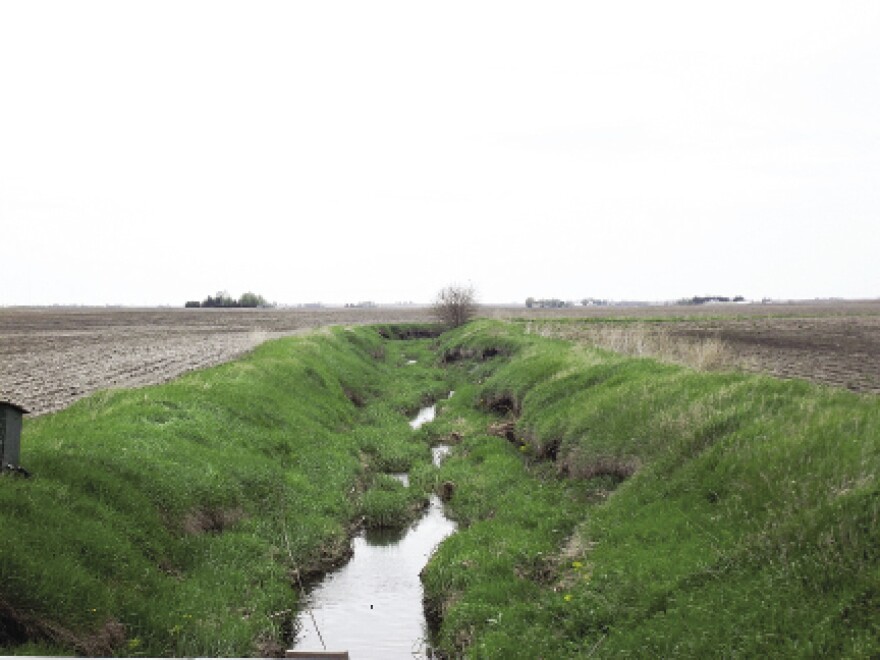Many farmers in central Illinois are worried they’ll face additional regulations under a proposed new rule from the EPA. The U.S. Environmental Protection Agency and the Army Corps of Engineers say that rule only clarifies what waters the federal government can, and cannot, regulate.
Thousands of people have used a public comment period that ends on Friday to condemn the proposed “Waters of the U.S.” rule. But the agencies say much of that criticism is based on misinformation.
Farmer Lin Warfel drives a 4-wheeled John Deere Gator cart across one of his fields in Champaign County. It’s a sunny Wednesday in early November. Recent rains forced Warfel to take a break from harvesting his roughly 2,000 acres of corn and soybean.
"We’re on our farm that was started in 1882 by my great grandfather."
Warfel’s German-immigrant ancestors were among the first farmers to drain the once-swampy land that used to make up much of this part of central Illinois. This year, he says, is different, with a proposed federal rule to protect waterways that he worries will make life more difficult for farmers, and cost families more in the grocery aisle.
"In agriculture, we’re at a point where we want to really tell people, “Stop! Wait! Give us some relief, here. Back off.”
He’s talking about the EPA and the Army Corps of Engineers. The agencies put forward a rule to clarify what qualifies as “waters of the United States” … meaning which streams, lakes, rivers, ponds, ditches and other waterways the agencies can regulate under the Clean Water Act. A series of Supreme Court decisions left that unclear. Warfel, and farmers like him, largely oppose the new rule.
"It’s very concerning. The ambiguity of the regulations will lead to lots of problems for me as a farmer. I focus on being productive and I need to make a profit. And so, the more regulations I have to put up with, the less profit I have, the more complicated my production practices get. And so, I’m very concerned about this new set of regulations."
The EPA has received thousands of comments from people and organizations against the rule, including from a handful of farmers in Champaign County. The Illinois Soybean Association, the Illinois Beef Association and the Vermilion County Farm Bureau all submitted comments. A Midwest Center for Investigative Reporting social media analysis found that there were at least 14,000 tweets and retweets since August connected with a public campaign to “Ditch The Rule.”
"There’s a lot of misinformation out there saying that farmers are now going to need permits to plow their fields and, you know, that puddles are now waters of the U.S."
That’s Ellen Gilinsky, an EPA senior policy advisor. She says much of the criticism may be misguided. She points out that, under the proposed rule, farmers will continue to have the same special exemptions and exclusions under the Clean Water Act that they’ve had for nearly 40 years.
"We are not changing any of the exemptions for normal farming, silviculture and ranching. So, basically, farmers do not need a clean water act permit to conduct their normal farming activities."
UC Davis law professor Albert Lin, who specializes in environmental law, backs that up, adding that the EPA does not have the power to override those exemptions anyway.
"To begin with, it’s worth noting that the statute itself provides explicit exemptions for certain agricultural operations, such as the discharge of dredge or fill from normal farming operations or irrigation-return flows. These exemptions are found in the statue itself, and so could not be changed by an agency rule."
To counter the “Ditch The Rule” campaign, supporters of the Waters of the U.S. rule came up with a Twitter tag of their own, “Ditch The Myth.” Gilinsky says that tag, along with information posted on EPA.gov, helped cut through what she calls the “misinformation.” Even if the rule is adopted, Lin, the lawyer, says the EPA’s jurisdiction remains open to interpretation. Which means it’s likely to be challenged sooner or later.

